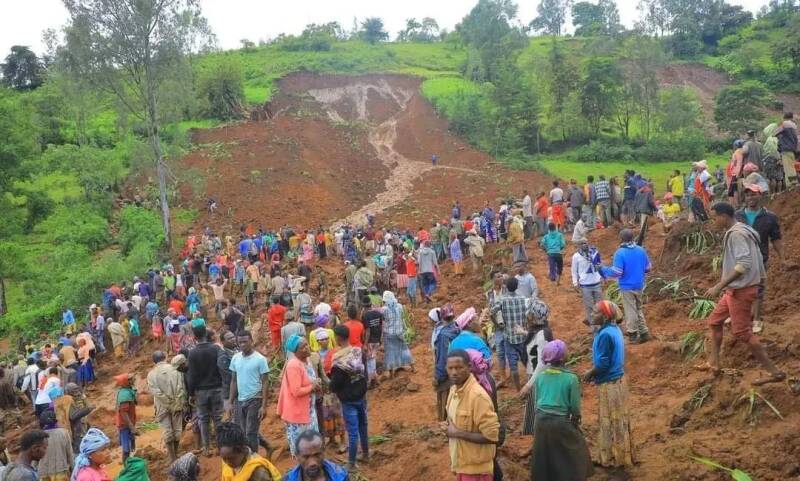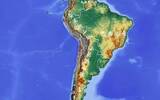The death toll reached 229! Serious landslide occurred in Ethiopia
According to Ethiopian media reports, on the evening of July 21, local time, a landslide occurred in the the Gofa Zone district of the southern Ethiopian state, causing heavy casualties and property losses, and the cumulative death toll has exceeded 229, and the number of casualties is expected to rise further.
According to the chairman of the local emergency response committee, rescue teams have found 229 bodies, including 148 men and 81 women, including children, but the death toll is likely to increase and rescue efforts are under way. However, some volunteers have pointed out that the lack of mechanical equipment poses great challenges to the search process.

It is understood that the cause of the landslide is that Ethiopia Yegasuefei about 100 kilometers of Gofa region recently suffered heavy rainfall, resulting in loose soil and led to landslides on the evening of the 21st. Rescue efforts were carried out immediately after the accident, but at about 10:00 in the morning of July 22, a second landslide occurred, burying rescue workers and onlookers, resulting in a significant increase in the death toll.
As early as April and early May this year, heavy rains and floods raged in southern Ethiopia, affecting more than 19000 people, displacing thousands of people and damaging infrastructure.
On July 19, the Ethiopian government issued a safety warning that Ethiopia would be at risk of widespread flooding due to heavy rainfall. And now Ethiopia is entering the heavy rain season, with frequent heavy rains from July to September, which will lead to the risk of flooding, waterlogging and landslides.
As a result, the Minister of State of Ethiopia listed Oromia, Afar, Somalee, Tigre, Gambera, Bensangulgumaz, Amhara, Southern and the capital Addis Ababa as areas likely to be affected by flooding.
In addition, the Chinese Embassy in Ethiopia also took note of the incident and issued a circular. The notice said that June to October is the Ethiopian rainy season, heavy rainfall, easy to cause floods, landslides and other geological disasters. Therefore, Chinese citizens and institutions in Ethiopia are reminded to strengthen their awareness of natural disaster prevention, pay close attention to weather forecasts and all kinds of early warning information, and earnestly strengthen flood control and disaster prevention measures.
Moreover, the accident occurred in southern Ethiopia, where there are many coffee producing areas, such as kaffa, Djimmah and Yirgacheffe, and belong to Ethiopia's major commercial bean producing areas. In Ethiopia, coffee beans are harvested from October to March, during which heavy rains will knock down some berries, while floods and landslides will directly damage the coffee growing environment and part of the infrastructure, resulting in a reduction in coffee production.

At present, the Ethiopian coffee industry is full of difficulties, there have been conflicts in northern Ethiopia, and civil war may break out in the future. Recently, the southern region has to face disasters such as heavy rainfall, which has led to a reduction in coffee production. In addition the Red Sea crisis has been affecting Ethiopia's only port of Djibouti resulting in an impact on the export volume and physical costs of goods such as Ethiopian coffee. In this regard, many people in the coffee industry hope that the government can solve the problem as soon as possible.
Important Notice :
前街咖啡 FrontStreet Coffee has moved to new addredd:
FrontStreet Coffee Address: 315,Donghua East Road,GuangZhou
Tel:020 38364473
- Prev

Starbucks co-branded YONEX and invited Lin Dan to play ball! Focusing on the badminton player's wallet?!
▲ Click to pay attention| Daily Boutique Coffee Culture Magazine Coffee Factory Recently, Starbucks and the famous badminton brand YONEX announced a joint cooperation and said they will launch a limited joint badminton racket, which attracted the attention of Starbucks fans and many badminton players for a time. Last Saturday, well-known badminton player Lin Dan came to Singapore
- Next

Introduction to the Brazilian coffee producing area of Espírito Santo in South America
South America is the world's four continents and is one of the most volcanoes in the world. It has diverse natural resources such as the Andes and the Brazilian Plain, and most of South America has a tropical rainforest climate and a tropical savanna climate, which is warm and humid. These conditions are very suitable for coffee planting, so South America has many
Related
- What grade does Jamaica Blue Mountain No. 1 coffee belong to and how to drink it better? What is the highest grade of Blue Mountain coffee for coffee aristocrats?
- What are the flavor characteristics of the world-famous coffee Blue Mountain No. 1 Golden Mantelin? What are the characteristics of deep-roasted bitter coffee?
- Can I make coffee a second time in an Italian hand-brewed mocha pot? Why can't coffee be brewed several times like tea leaves?
- Hand-brewed coffee flows with a knife and a tornado. How to brew it? What is the proportion of grinding water and water temperature divided into?
- What is the difference between Indonesian Sumatra Mantinin coffee and gold Mantinin? How to distinguish between real and fake golden Mantelin coffee?
- What does bypass mean in coffee? Why can hand-brewed coffee and water make it better?
- Unexpected! Ruixing Telunsu lattes use a smoothie machine to foam milk?!
- % Arabia's first store in Henan opens into the village?! Netizen: Thought it was P's
- Does an authentic standard mocha coffee recipe use chocolate sauce or powder? Mocha Latte/Dirty Coffee/Salty Mocha Coffee Recipe Share!
- What is the difference between Vietnam egg coffee and Norway egg coffee? Hand-brewed single product coffee filter paper filter cloth filter flat solution!

